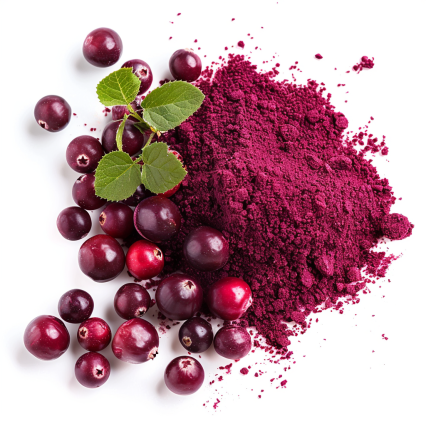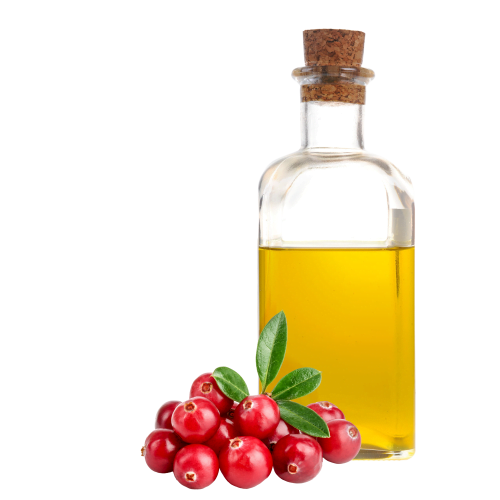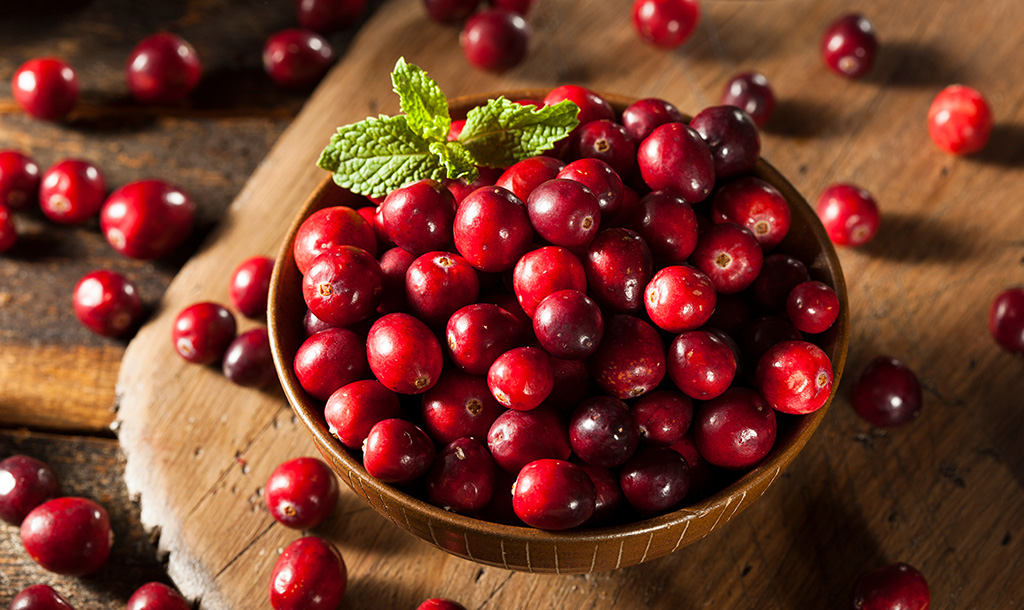Cranberries are a popular culinary addition to both savory and sweet dishes as well as baked goods. The berries are used to make sauces, jams, juices and other preserves, which not only have high nutritional value, but also proven medicinal properties. In some cases, cranberry can even be as effective as synthetic drugs. What diseases does cranberry address and how to use it?
Properties of cranberry
Cranberries, like other domestic fruits (raspberries, blackberries, strawberries), have a high content of flavonoids and anthocyanins – compounds with strong antioxidant activity. Antioxidant activity is associated with protection of cells from oxidative stress and inhibition or scavenging of free radicals, which translates into reduced risk of developing lifestyle diseases such as insulin resistance, hypertension, atherosclerosis, and cancer.

Cranberry extract 5% PAC
Cranberry extract 5% PAC is produced from the fruit of Vaccinium Macrocarpon L. Thanks to its health and care properties, it is used in many fields, from dietary supplements to pharmaceutical products to advanced cosmetics.
In addition, cranberry fruit is a rich source of numerous vitamins and minerals (potassium, calcium, iron). Most appreciated in phytotherapy, however, are the antimicrobial properties of cranberries, both dried and in the form of juice. These properties are attributable to the presence of compounds called proanthocyanidins – flavan-3-ol derivatives. By lowering the pH and acidifying the urine, they reduce the adhesion of bacteria to the epithelium of the lower urinary tract, showing preventive effect and supporting antibiotic therapy in urinary tract infections such as cystitis. Moreover, this activity also applies to other bacteria residing in the digestive tract – including in the stomach and mouth.
Conditions in which cranberry can help
Thanks to their wide-ranging properties and high content of antioxidant compounds, when included in everyday diet cranberries are very beneficial in the prevention of lifestyle diseases. At the same time, the berry’s positive effect on the lipid profile, achieved by reducing the level of “bad” LDL cholesterol, is important not only in the prevention of atherosclerosis, but also sometimes associated with weight loss-facilitating properties of dried cranberries.
However, it is in particular bacterial infections that cranberries can help the most. Physicians appreciate the proven preventive properties od cranberries in urinary tract infections. Cranberry extracts can also be found in over-the-counter medications and are sometimes recommended as an adjunct to antibiotic therapy when treating recurrent cystitis.
The antimicrobial effect of cranberries can also be helpful in treating stomach ulcers associated with Helicobacter pylori infection, in prevention of caries, and even in the early stages of rheumatic arthritis.
Use of cranberries in cosmetics
Cranberry extract and concentrated juice are also used in cosmetics. Thanks to the presence of vitamins, minerals and numerous polyphenols, the berries have positive effects on the condition of the skin – they nourish, moisturize and promote cell regeneration. Cranberry is therefore an ingredient of numerous cosmetics for mature skin, acne, dry and blemished skin, as well skin in need of rejuvenation. In addition, thanks to their antimicrobial activity, cranberries can also be used therapeutically in the treatment of certain skin diseases.

Cranberry Seed Oil
Cranberry seed oil is a natural vegetable oil extracted from the seeds of the cranberry fruit(Vaccinium macrocarpon). The oil is rich in fatty acids such as linoleic, oleic and palmitic acids, making it an excellent emollient and moisturizer for the skin.
Cranberry and pregnancy
Problems with recurrent urinary tract infections particularly affect women, with about 25% of them experiencing such infection at least once in their lifetime. At the same time, the period of pregnancy is a significant contraindication to the use of many medicines. In this context, is consumption of cranberries safe? The answer is yes: both dried cranberries and cranberry juice are completely safe during pregnancy – they do not affect the course of pregnancy or fetal development in all three trimesters. On the other hand, consumption of cranberries can also bring many health benefits. In addition to the aforementioned prevention against urinary tract infections, when taken in pregnancy cranberries can also help treat common colds, improve iron absorption and support treatment of constipation. Noteworthy, however, cranberries should not replace conventional treatments and any more serious conditions during pregnancy should be consulted with a physician.
Cranberries and children
The question of cranberries being consumed by children is slightly different. Given the potential gastrointestinal discomfort and, in part, a less sweet tart taste, cranberries can be introduced into children’s diets only after the age of one year, when they can start enjoying the benefits of cranberries in the form of juice or as an addition to food. If the child does not mind its taste, they will benefit from the richness of the vitamins contained in the fruit. Indeed, cranberries can be helpful in treating colds and strengthening immunity. On the other hand, cranberry preparations available in pharmacies for the treatment of urinary tract infections in children are mostly intended for children aged three years and older.
The daily dose of cranberries
Cranberries exhibit numerous health properties, but as with synthetic medicines, you need to take the right dose to reap the full benefits. How much cranberries to eat for cystitis prevention? It is estimated that in order to have an effect, one should consume:
- 100-300 g of fresh cranberries
- 7-10 g of dried cranberries
- 100-150 ml of cranberry juice (100%).
In other words, depending on your preference, you can include cranberry juice in your daily menu or opt to use the berries as an addition to your menu. The latter option offers tremendous opportunities to diversify the dishes in which one consumes cranberries. The fruit goes well with meats and savory dishes, as well as with sweet oatmeal porridge and cakes. Furthermore, your menu can include healthy salads and smoothies, in which cranberries are combined with other vitamin-rich and health-promoting fruits, such as banana, citrus fruits and apples. However, one should not forget about the caloric content of cranberries. While fresh cranberry is relatively low in calories (100 g is about 46 kcal), as a result of the drying process its caloric content can increase significantly – even to more than 300 kcal/100 g.
Contraindications
Supplements containing cranberry extract are relatively safe and their use does not carry many side effects. However, cranberries and cranberry products should not be consumed while taking anticoagulant medications (e.g. those containing warfarin), as they can interact with them leading to excessive bleeding and hemorrhaging. The berry should also be avoided by those suffering from osteoporosis and kidney stones – the oxalates present in cranberries can crystallize in the urinary tract (leading to the formation and development of kidney stones) and impede the absorption of calcium in the intestines.
When deciding to treat urinary tract infections with cranberry, it is also important to remember that its mechanism of action is based on acidifying the urine. It means that it can interfere with other herbs of similar applications. For example, preparations containing arbutin (a compound present in bearberry leaf, for example) show antimicrobial activity only in alkaline environment.
Literature:
- Baranowska M, Bartoszek A. Antyoksydacyjne i przeciwdrobnoustrojowe właściwości bioaktywnych fitozwiązków żurawiny. Postępy Higieny i Medycyny Doświadczalnej 2016; 70: 1460-1468.
- Doroszko M, Janda K i Jakubczyk K. Właściwości prozdrowotne wybranych owoców krajowych. KOSMOS Problemy Nauk Biologicznych 2018; 67(2): 415-423.
- Gryszczyńska A. Żurawina amerykańska (Vaccinium macrocarpon) – lek na problemy urologiczne. Urologia 2010; 63: 31-40.



Cranberries are not only tasty but also offer a range of impressive health benefits. These small, tart berries are packed with essential nutrients and antioxidants, making them a powerful addition to your diet.
One of the most well-known benefits of cranberries is their ability to support urinary tract health. They contain compounds called proanthocyanidins that help prevent bacteria from adhering to the urinary tract walls, reducing the risk of infections.
Cranberries are also rich in antioxidants, particularly vitamin C, which helps protect your cells from oxidative damage, supports immune function, and promotes healthy skin. The high antioxidant content also helps reduce inflammation and lowers the risk of chronic diseases such as heart disease and cancer.
i have a very busy lifestyle too, and i would always frequently eat on Fastfoods“